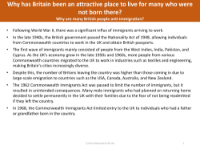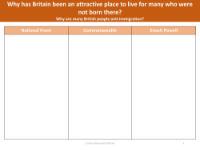Why are many British people anti-immigration? - Presentation

Geography Resource Description
Britain has historically been a destination of choice for many individuals not born there, owing to its perceived opportunities and the promise of a better life. Following World War II, the UK experienced a significant increase in immigration, prompted by labour shortages and facilitated by the Nationality Act of 1948, which allowed Commonwealth citizens to work and obtain British passports. The initial wave of immigrants primarily came from the West Indies, India, Pakistan, and Cyprus, attracted by job prospects in growing industries. Despite this influx, emigration of Britons to countries like the USA, Canada, Australia, and New Zealand meant that more people were leaving the UK than arriving. Over time, legislation such as the 1962 Commonwealth Immigrants Act and subsequent amendments were introduced to restrict immigration, leading to permanent settlement of many immigrants who had initially intended to return to their home countries.
However, the arrival of immigrants, including Asian refugees expelled from East Africa, was met with resistance from some sectors of British society. Hostility was evident in the media and through protests led by anti-immigration groups, notably the National Front. The public debate over immigration was further polarised by speeches from politicians such as Enoch Powell and Margaret Thatcher, which criticised immigration levels and contributed to a rise in anti-immigrant sentiment. Despite these challenges, immigrants in Britain have sought to integrate and have fought for their rights, with varying degrees of success and acceptance across different communities. The complexity of Britain's relationship with immigration is underscored by the varying reactions from the government, which recognised the economic benefits, and parts of the population, who feared job and wage competition, occasionally leading to social tensions.



